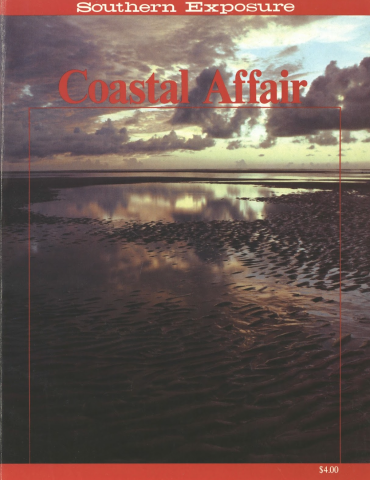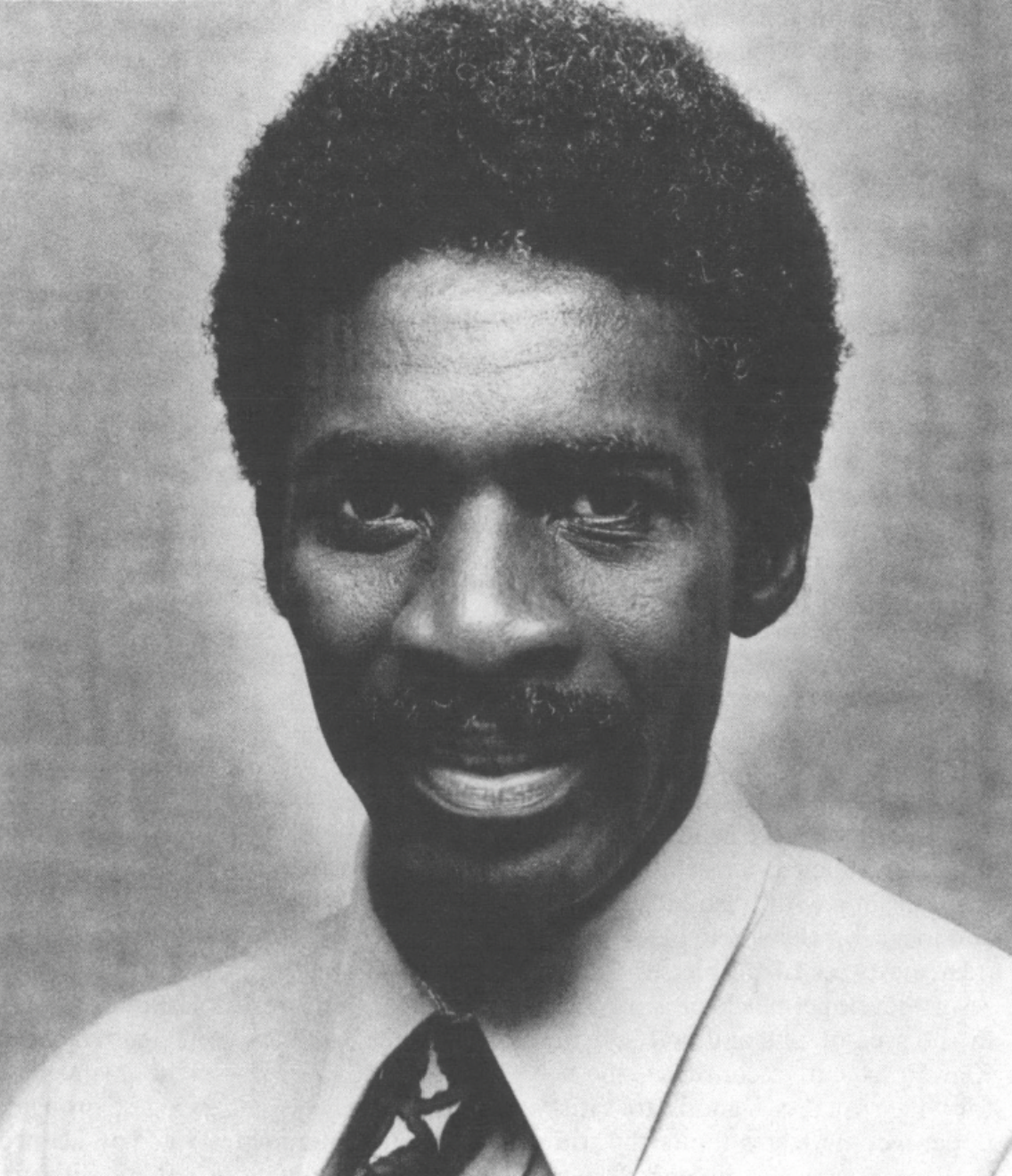“We Are an Endangered Species:” An Interview with Emory Campbell by Vernie Singleton

This article originally appeared in Southern Exposure Vol. 10 No. 3, "Coastal Affair." Find more from that issue here.
The historical isolation of the Sea Islands, until 25 years ago when we were connected to the mainland by causeways and bridges, brought about a unique lifestyle. You learned how to use what was there without any kind of artificial or manufactured mechanism to sustain life. You had to hew out your mast for your sailboat from a tree; and you protected those long straight trees. You had to use that river, go in the river and do your fishing. You had to use the ground, so you were careful not to destroy the ground. You made sure that you planted peas one year and did something else with the ground one year so that you could have what they call “strength” in the soil.
During the winter months, you had to hunt and for some reason you would never hunt during the summer. It wasn’t the law said not to hunt. For most Hilton Head people, it was because they knew the animals were pregnant - that was distasteful, to shoot and eat a pregnant animal. But at the same time, they unconsciously protected the whole species of animal.
Resort development has destroyed the habitat of the deer. I have seen them swimming across to Daufuskie Island, getting out of the way. They have found rattlesnakes three miles offshore, swimming away from this island. We will eventually destroy all of our watershed, places that would hold rainfall. Water that the river is going to take is not going to be filtered because you’re not going to have the ground for it to saturate through, so you’re gonna find a whole lot more pollution in your streams. The very things people came here for — like fresh oysters, shrimp and fish — are being destroyed because they’re destroying most of their spawning places.
The other impact on the environment is on the habitat of our people - the space on this island gonna be so precious and so crowded. People are stressful just driving from home to work. People are working more, too long hours, getting less pay but at the same time trying to increase a kind of standard of living to keep up with what’s around them. The island has a kind of affluence atmosphere, so we got two people and their children working to try to catch up. I see that this stress on the family has already driven a lot of children to work rather than to be a child. They are becoming an adult member.
Our parents have always worked hard to eke out a living on this island, but we never had the stress we have in today’s island economy. It used to be that the family went into the field working together, in a working environment where you learn about each other. You learn strengths and weaknesses of the brothers and sisters. Then there was always mom and dad to tell the stories about what happened to granddaddy years ago, in this same field.
Now what you find is one person rushing off to work in this direction and another rushing off in the next direction. You don’t have time to talk, don’t even have time to sit down and eat breakfast together.
It’s going to be worse. It’s going to lead to drinking. It’s going to lead to a lot of tension between husband and wife. It’s going to lead to some of that spilling over onto the children. They’re either going to be ignored or they’re going to be treated differently, with a lot less love, because our interests, as I have been witnessing here, are changing to more material things — more television sets, better furnishings, a better car.
I was addressing a crowd of environmentalists at the Cousteau Institute, and I told them that we have given up on trying to protect the shrimp and the crab because we had become the new endangered species. The black native population of these islands is now endangered and we don’t have too much time to protect oysters, fish and crab.
They thought it made a lot of sense. A couple of people in the class said that we are just one example of many throughout the world. Developers just come in and roll over whoever is there, move them out or roll over them and change their culture, change their way of life, destroy the environment, and therefore the culture has to be changed.
There is another part of this that you must realize. A lot of people see us as some people who were brought to these islands to pick cotton and even though we now own property, we’ve got no right to these islands whatsoever because we were brought over here as slaves. So they think anything that happens to us now as a result of development is justified. We’re looking at it from a different side. We’re looking at it as human beings having our rightful positions on this island. They don’t see it that way.
Daufuskie’s blacks are now being treated pretty much the same way as Hilton Head blacks were treated. It’s nothing more than a spillover of what’s happened on Hilton Head. The same kind of developers are going over there. They said they gonna change development style just a bit on Daufuskie, but in our initial conversation with one of the key developers, it’s clear there is no respect for the native population. And that’s what we’re dealing with: a matter of respecting what’s there in one’s culture.
In order to stay here, we got to make double-time educating people in the community — doing community education as it relates to land, as it relates to heritage, as it relates to the future of this island and how we and our children are going to fit in it.
I’ve been struggling over the past eight years to keep a family coalition going so that we could show that within a family, we can do something just by cooperating and developing land or buying land. We have pooled our resources to invest in some land on the island. We hope that in the future we’ll be able to develop it into something that is compatible and needed in the community and, at the same time, provide an income for either us or our children.
That’s what all our foreparents did. That’s how black land ever got here — how black land ownership ever came about — is by people like my grandparents getting up early in the morning, working the field to buy land. Land was precious and it’s going to be precious again because we ain’t gonna have any.
There are a lot of opportunities here but we have to establish them ourselves, for ourselves, our community and children to come. I don’t see any reason why black people in this country or anywhere shouldn’t be in a position themselves to establish worksites for their own people. We need houses built. We need water lines in our communities. We need sewers. There is no reason why the person graduating this year shouldn’t be preparing for somebody that’s going to graduate, five, 10 years later to be employed. I don’t think we can lie around much longer saying, “The Man won’t give me a job.”
We have to open up our own businesses — and this is the place for it. We get millions of tourists here every year. If we can get motivated to go to school and learn the kind of management skills and business skills that we could put into a business — this is the place. We got our land and everything to do it. And it can be done. It takes, first, the family coalition; then if you need to reach outside the family and form coalitions, you do that.
The world works around what groups of people can produce and how groups of people are recognized. People are recognized in the world similar to the way countries are recognized. If you’re a threat military-wise, you’re recognized, and if you’ve got something to offer you’re recognized. Being a group of people that does the pot-washing ain’t gonna get it. That’s where the teen-age boy is every night now. He’s washing pots and therefore he’s not getting a good education. After high school, he’s not going to be in a position to do anything.
So many blacks here are not motivated to go beyond the tenth, eleventh grade because they see the immediacy of the dollar, the automobile or whatever the “good life” offers these days. The few that have gone to college, they’re motivated to leave rather than stay. They can’t tolerate the situation: we just don’t have the kinds of jobs here that would dignify staying; they become overwhelmed by the subservient roles that most blacks are put in here.
We have to look to alternative education for our children to keep them from dropping out. And we have to educate our grownups about how the world works, and let them know that education of the young is important once again. Let them know that it’s important for them not to send their children to work, but to keep sending them to school to get that math. Let them know that it’s important for them to know what they’re going to do with land 10 years from now, so that if a Land Use Plan
or Zoning Ordinance or Planning Commission comes up with something, they can make it known that we want to plan jobs, transportation, education and how those things are going to impact on the island’s future.
If there’s one important aspect of what we’ve got to do — and do well — that is concentrating on our kids. The education process here on Hilton Head just showed its negativism the other day towards the black community. We thought that it’s important for a black assistant principal to be at Hilton Head Elementary School. Some people say, “Why is that important? What’s the difference between a black and a white? What is it, just to have a black face there.”
No, that’s not it. It’s to have a black face there that is in tune with the culture of the black child of this island. That child’s heritage, home environment, is different from a child who came here from Chicago, New York or Ohio. And that’s where a lot of our white kids are coming from; so you put them in a classroom and say you’re integrated and you got a classroom situation at Hilton Head Elementary School that’s oriented to those kids who are moving in. We think the school has to ensure that there is somebody there who is looking at the process, seeing who is falling out of it and saying, as a link to the black community, what can we do after school or what can we do in this home so that this kid can get an education. Otherwise, they’re going to get much less than people like myself got 30 years ago in a segregated situation.
Tags
Vernie Singleton
Vernie Singleton is a free-lance writer and a native of Hilton Head Island. (1983)

